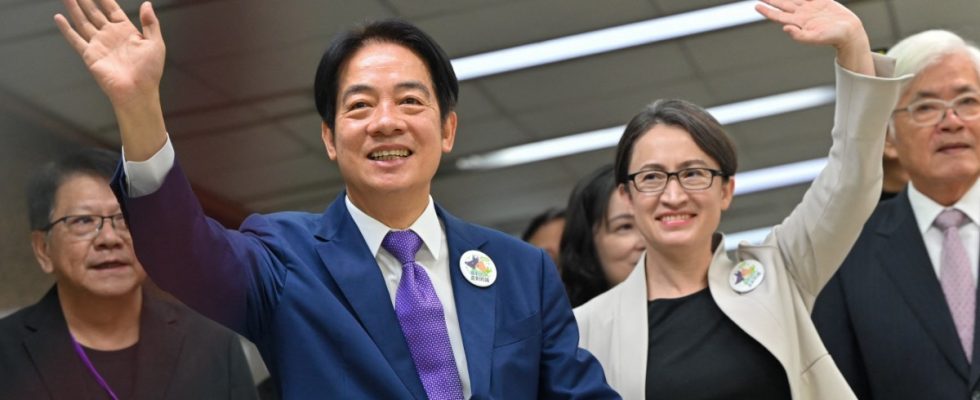His supporters were already cheering warmly when the man with the youthful face and the broad smile came onto the stage: Lai Ching-te, the leading candidate of the Democratic Progressive Party (DPP). Late on Sunday evening he came to a school in Taipei for his speech; the sports field was full. Lai wears a jacket in the party’s color green and triumphantly raises his fist in the air. “Taiwan, keep it up!” shout his supporters. And: “For freedom!”
After a dramatic week of campaigning, things are looking good again for Taiwan’s vice president, who is running for the presidency in the mid-January elections. The 64-year-old had been ahead of the other candidates in most polls in recent months. Recently, however, an alliance envisaged by the opposition threatened to put him in trouble. The China-friendly Kuomintang (KMT) and the Taiwan People’s Party (TPP), founded in 2019, planned to merge.
The voters now have to decide – this makes it more difficult for both parties to win the election
However, these plans collapsed on Thursday in a memorable press conference: After weeks of negotiations about which of the two parties would be allowed to nominate the top candidate, both camps met in a luxury hotel in Taipei. There the two opposition leaders exchanged blows in front of the cameras, which ultimately ended in a party split.
On Friday, the KMT candidate Hou Yu-ih and TPP candidate Ko Wen-je registered separately as presidential candidates just a few hours before the deadline – the cooperation was broken. The break now means that sympathetic voters have to choose one of the two pro-Chinese parties, making it more difficult for both to win the election.
The development is likely to be viewed with great disapproval in Beijing. Elections in Taiwan are always a vote on the future relationship with its large neighbor. Lai is an irritant and a “troublemaker” for the Communist Party leadership. In 2017, the politician described himself as a “political worker for Taiwanese independence,” drawing anger from Beijing.
Most people reject unification with China, but no one wants a war
The island state, just 160 kilometers from China’s coast, is actually independent of the People’s Republic. But in order not to provoke Beijing, Taiwan never officially declared its independence. The Communist Party makes historically questionable claims to the island state, and state and party leader Xi Jinping threatens to take it by force if the Taiwanese do not join voluntarily.
Even if Lai were to win, a declaration of independence is considered almost impossible: even before his official candidacy, the Vice President had announced that his country was already a “sovereign and independent nation”, so a further declaration was not necessary. The statement was also meant as reassurance to voters who see an overly radical stance as a threat to Taiwan. Although most of Taiwan’s 24 million people reject unification with China, no one wants a war. “We must not allow ourselves to be intimidated by China. Let us not be afraid,” Lai shouted to his supporters that evening.
Since the Progressive Party led by President Tsai Ing-wen came to power in 2016, relations with the People’s Republic have steadily deteriorated. In August 2022, these reached a low point when the Speaker of the US House of Representatives, Nancy Pelosi, flew to the island for a visit. Beijing then effectively established a military blockade around Taiwan for the first time with a military exercise.
The numerous military exercises are intended to wear the Taiwanese down
An election victory for the China-friendly Kuomintang or the Taiwan People’s Party should make it easier for Beijing to negotiate rapprochement with Taipei. China’s threats against Taiwan are also one of the central points of contention between the USA and the People’s Republic. Washington accuses Beijing of constantly shifting the status quo in the Taiwan Strait. After the failure of the party alliance, Beijing is likely to increase pressure on Lai’s campaign. Experts are already reporting election interference from mainland China.
So far, Beijing has mainly relied on a mixture of economic coercion and military threats in dealing with its small neighbor. Experts have long been warning of a war in the gray zone: fighter jets penetrate the Taiwanese air traffic control zone almost every day; The ongoing military exercises are intended to wear down the Taiwanese. There are also cyber attacks and false news, and Beijing is also trying diplomatically to further isolate the country.
The USA is likely to welcome an election victory for Lai: The country not only sells weapons to Taiwan, in August the government approved direct military aid for Taiwan for the first time as part of an aid program for foreign governments. Top candidate Lai nominated Hsiao Bi-khim for vice presidency just a week ago. The Chinese-sanctioned politician was previously Taiwan’s representative in the United States. A nomination that is likely to be perceived in Beijing as the next provocation.
In addition to the presidential election in January, Taiwan will also decide on a new parliament. Many of the presidential candidates’ announcements cannot be implemented without parliamentary approval. The forecasts for the Progress Party there look significantly worse. A defeat would block Lai and make it difficult to implement many of his future plans. “We are united” is something else the politician shouts across the sports field on Sunday. It will become clear in January at the latest whether he is right.

